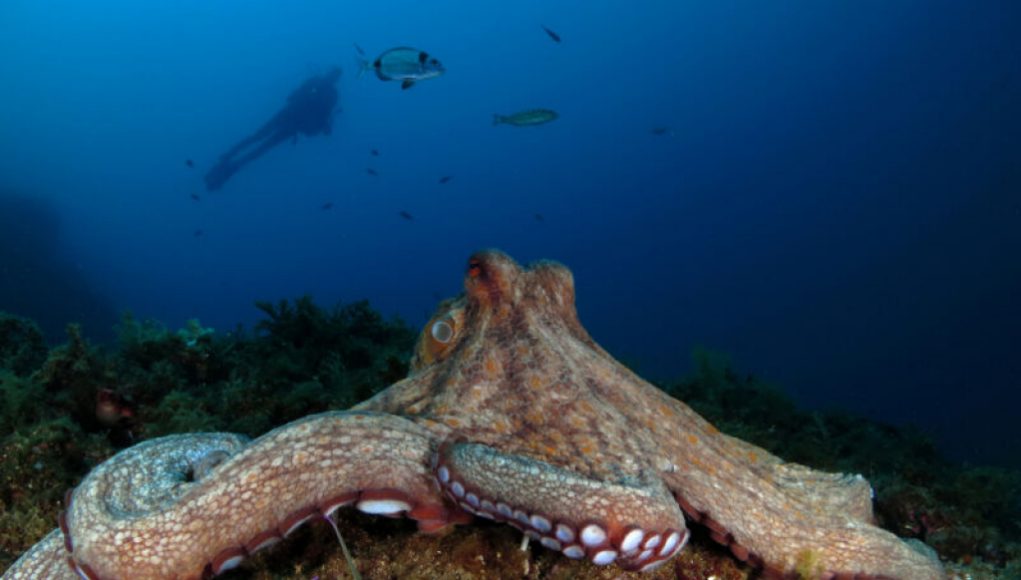Did you know that octopuses can dream? It turns out that these fascinating creatures, despite being invertebrates, experience REM (rapid eye movement) sleep, the phase of sleep associated with dreaming. This discovery makes octopuses the first known invertebrates capable of REM sleep.
Octopuses have always surprised scientists with their similarities to vertebrates, especially in terms of neural function. Despite lacking a spine, they have evolved a complex nervous system that resembles that of humans and other vertebrates. In fact, a recent study found that certain parts of their brains, such as the frontal and vertical lobes, function similarly to the hippocampus and limbic lobe in vertebrates. These brain regions are responsible for learning, memory, and complex emotional reactions.
But the similarities don’t end there. Researchers at the Okinawa Institute of Science and Technology have discovered that octopuses also exhibit two stages of sleep: quiet sleep (NREM sleep) and bursts of neural activity similar to the waking state (REM sleep). During REM sleep, the octopuses’ eyes and tentacles twitch, and their skin changes color. This finding suggests that octopuses may have complex cognitive abilities similar to those associated with two-stage sleep in other animals.
Are Octopuses Really Asleep?
To confirm that octopuses were indeed asleep, the researchers conducted a series of tests. They waited until the octopuses were lying flat on the bottoms of their tanks, indicating a sleep-like state. When the researchers stimulated the sleeping octopuses, they observed a delayed reaction compared to when the octopuses were awake.
The researchers used a technique called local field potential (LFP) recording to observe the brain activity of the sleeping octopuses. LFP recording involves inserting probes into the animals’ brains to track the electric potential surrounding neurons. This method allowed the researchers to detect changes in brain activity during different sleep stages.
During NREM sleep, the octopuses’ brain activity was minimal, and any behavioral changes were subtle. However, during REM sleep, the researchers observed a significant increase in activity in the frontal and vertical lobes, the same regions that resemble human brain activity. Additionally, the researchers noticed changes in the octopuses’ skin color during REM sleep.
What Do Octopuses Dream About?
Octopuses change color at the cellular level using specialized cells called chromatophores. These cells contain pigment sacs that expand or contract, making different pigments visible. The researchers speculate that the color changes observed during REM sleep could be related to the octopuses mentally practicing camouflage based on their memories. This suggests that octopuses may indeed dream.
Neuroethologist Sam Reiter, the lead researcher of the study, plans to further investigate the sleeping octopus brain and determine whether the color changes during REM sleep are indicative of dreams. The incredible discoveries about octopuses’ sleep patterns and cognitive abilities highlight the remarkable nature of these ancient creatures that have been around for 550 million years.
Nature, 2023. DOI: 10.1038/s41586-023-06203-4 (About DOIs).
Elizabeth Rayne is a creature who writes. Her work has appeared on SYFY WIRE, Space.com, Live Science, Grunge, Den of Geek, and Forbidden Futures. When not writing, she is either shapeshifting, drawing, or cosplaying as a character nobody ever heard of. Follow her on Twitter @quothravenrayne.
Recent studies in marine biology have revealed that octopuses, despite being radically different than humans, may go through the same phases of sleep and potentially dream in a similar fashion.
The nocturnal cephalopod has long intrigued scientists due to its ability to solve complex puzzles and seemingly assessing its environment in a manner similar to that of humans. Even more startling is the fact that, despite the lack of a forebrain, the octopus is still capable of dreaming.
The ancient octopods would likely have engaged in both slow sleep (similar to human slow wave sleep) as well as REM sleep (similar to human rapid eye movement sleep). During REM cycles octopuses show signs similar to those shown by humans during dreaming. This includes a decrease in the response to external stimuli as well as the occasional twitch of a tentacle – both behaviors found in humans during sleep.
Furthermore, research suggests that this behavior may have an evolutionary purpose. In a controlled laboratory environment, octopuses, upon entering REM sleep, would more frequently attempt to solve puzzles already solved previously – potentially reinforcing prior successes.
So while we cannot definitively say that octopuses dream in a manner similar to humans, the evidence available suggests that the cephalopods may be traversing similar dreamscapes as humanity. In the future, a greater appreciation for the cognitive capabilities of the octopus may lead to a greater understanding of cognitive behavior and dream states of both humans and marine life.




















